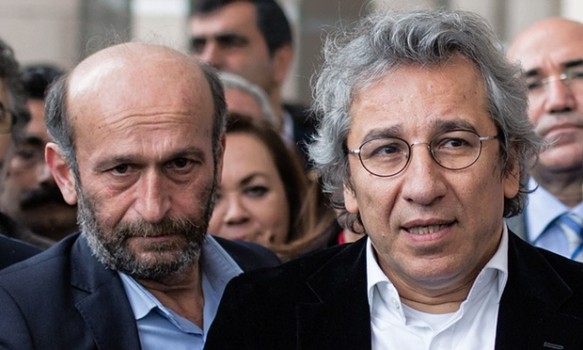PHOTO: Can Dundar, editor-in-chief of opposition newspaper Cumhuriyet (right), and Ankara bureau chief Erdem Gul after their arrest, November 26, 2015 (Vedat Arik/AP)
In late November, the editor-in chief of Cumhuriyet, Can Dündar, and the newspaper’s Ankara bureau chief were imprisoned on accusations of spying and “divulging state secrets”.
Their crime? Claiming, with the support of video evidence from January 2014, that the Turkish Government was sending arms to rebels in Syria.
Turkey is the world’s leading jailer, on a per capita basis, of reporters. Two editors were released earlier this week, but more than 30 journalists are still behind bars.
Dundar writes in The Guardian of London:
In Turkey, a debate as old as government itself is on the agenda again. This time, it is the Turkish government’s secret arms transfer to Syria that has revitalised the subject.
Early in 2014, a truck understood to belong to the Turkish intelligence service MIT was stopped near the Syrian border. The gendarmerie and the intelligence officials in control of the convoy pulled guns on each other. This was the moment the two blocks vying to rule the state came face to face. The truck was searched. Beneath the camouflage composed of medicines boxes, weapons and ammunition were found. The truck was held for a while, but following the intervention of government officials a safe passage into Syria was granted.
The government immediately discharged the prosecutor and gendarmerie who stopped the convoy and had them arrested. It was declared that the trucks contained humanitarian aid. This incident, which fuelled allegations that President Recep Tayyip Erdoğan’s government was intervening in the Syrian civil war, was rapidly covered up.
In May 2015, however, Cumhuriyet Daily, the newspaper I serve as the editor-in-chief, acquired the footage of this incident. It was clearly visible that the truck was loaded with arms. It was thus documented that the intelligence service was illegally carrying arms into the civil war raging in a neighbouring country. This was big news. We published details of the operation with photos, and uploaded the video to our website.
Erdoğan was in a fix. He couldn’t refute the story, so instead chose to censor the publication and threaten the journalist responsible, who was me. In a live broadcast on a state TV channel, he said: “The person who wrote this story will pay a heavy price for it; I won’t let him go unpunished.” He added that the footage was a “state secret”, and that publishing it was an act of “espionage”. Furthermore, as if to confirm that this was not the state’s secret but his secret, he filed a personal complaint to the prosecutor’s office.
The punishment he demanded for me was two life sentences — for “treason” and for “acquiring and publishing classified information for the purpose of espionage”. This signaled the arrest of those of us who were well aware that the president of the republic’s wishes are received as orders by the judges of the criminal court. Thus, on 26 November I was arrested along with Erdem Gül, our Ankara bureau chief, who published the gendarmerie’s “Yes, the trucks had guns” report. Just 10 days before my arrest, I received a Reporters Without Borders press freedom award on behalf of Cumhuriyet.
Following criticism of the arrests from domestic and international press and human rights organisations, the Minister of Justice declared that “every country is sensitive on security” and cited Julian Assange and Edward Snowden as examples. The US ambassador to Turkey responded: “We chased after those that leaked the information, not those that published it.”
This was yet another blow for the oppressive Erdoğan regime, which has plummeted in the press freedom rankings. It also sparked questions that have surfaced time and time again in many scandals, from Iran-Contra to Watergate, from the Pentagon Papers to the Clive Ponting affair. When the state’s need for security contradicts the public’s right to information, which carries a higher priority? Can the threat to security be an excuse for government attempts to muzzle the media? When the stamp of “state secret” has turned into a veil concealing the dirty dealings of administrations, is it not the duty of a journalist to tear it away? Who determines what is in the best interests of the society?
As a journalist detained in solitary confinement in a prison in İstanbul, faced with accusations of “espionage”, I have been seeking answers to these questions. My conclusion is that no label of “state secret” and no rationale for “state security” permits a state crime. Thus I defend myself with Winston Churchill’s words: “The Official Secrets Act was devised to protect the national defence…and ought not to be used to shield ministers who have a strong personal interest in concealing the truth.”

